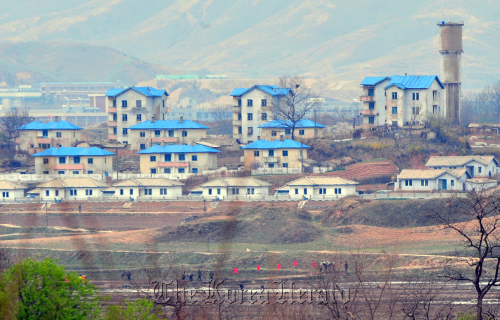N.K. likely to tie food assistance with dialogue with South Korea
While the rest of the world is growing more willing to provide North Korea with much-needed food, the South remains stubborn with last year’s deadly attacks fresh in its memory.
It is becoming more difficult, however, for the conservative government in Seoul to maintain its stance as even its staunchest ally Washington is moving to resume stalled food shipments to the impoverished nation.
The change in position by the U.S. has been noticed following former President Jimmy Carter’s visit to Pyongyang last month.
The ex-head of state, who remains well regarded in North Korea for his role in helping work out a nuclear deal in the 1990s, pressed his government and Seoul to resume food aid to the North, calling it “a human rights violation” to “deliberately withhold assistance” for political reasons.
The State Department echoed Carter’s position shortly after his press conference, saying it was Washington’s “long-standing goal” to provide humanitarian assistance to nations in need.
“The United States remains concerned about the wellbeing of the North Korean people,” said Darragh Paradiso, a spokesperson for the State Department.
Since taking office in 2008, President Lee Myung-bak in Seoul has been firm on not sending aid to Pyongyang unless it keeps to its pledge to denuclearize. Shipments of food stopped completely last year, when North Korea conducted two deadly attacks that killed 50 South Koreans.
While the rest of the world is growing more willing to provide North Korea with much-needed food, the South remains stubborn with last year’s deadly attacks fresh in its memory.
It is becoming more difficult, however, for the conservative government in Seoul to maintain its stance as even its staunchest ally Washington is moving to resume stalled food shipments to the impoverished nation.
The change in position by the U.S. has been noticed following former President Jimmy Carter’s visit to Pyongyang last month.
The ex-head of state, who remains well regarded in North Korea for his role in helping work out a nuclear deal in the 1990s, pressed his government and Seoul to resume food aid to the North, calling it “a human rights violation” to “deliberately withhold assistance” for political reasons.
The State Department echoed Carter’s position shortly after his press conference, saying it was Washington’s “long-standing goal” to provide humanitarian assistance to nations in need.
“The United States remains concerned about the wellbeing of the North Korean people,” said Darragh Paradiso, a spokesperson for the State Department.
Since taking office in 2008, President Lee Myung-bak in Seoul has been firm on not sending aid to Pyongyang unless it keeps to its pledge to denuclearize. Shipments of food stopped completely last year, when North Korea conducted two deadly attacks that killed 50 South Koreans.

Washington, which remains undecided over the issue on the surface, has formerly been firm not to resume talks or aid before Seoul is satisfied with Pyongyang’s apology over last year’s violence. The North remains mute over the issue.
“We are not saying no, not ever (to food aid),” a senior Foreign Ministry official said during a recent meeting with reporters. “We are concerned, however, where the food is actually ending up at. Few North Korean defectors recall receiving food.”
The official, who wished to remain unnamed, expressed strong doubts about outsiders’ ability to monitor distribution of food by the iron-fisted North Korean regime.
“They could easily pretend to give food to people and take it back after the monitoring,” he said.
Pyongyang’s reclusive Kim Jong-il regime has often refused to let outsiders monitor its food distribution process, triggering suspicions that most of the donated food is being used to feed its army and political elite.
Aware of such suspicions, the World Food Program said this week it will increase its personnel residing in North Korea to tighten monitoring of the distribution of donated food.
The U.N. agency is preparing to launch an emergency operation to help feed 3.5 million starving North Koreans by providing 310,000 tons of food within the next year.
The North, which had been upping reconciliation efforts toward South Korea since the beginning of this year, has fallen silent since Carter’s visit. The silence may indicate the communist state’s move to press Seoul by linking aid with dialogue, analysts say.
Upon China’s suggestion, partners of the stalled multinational nuclear disarmament talks have been trying to get the chief nuclear envoys of the two Koreas to meet as the first step toward restarting full-scale negotiations. The six-nation denuclearization talks, involving the two Koreas, the U.S., Japan, China and Russia, have been suspended since the end of 2008.
In a message to the visiting ex-U.S. president, North Korean leader Kim said he was “prepared for a summit meeting with the South Korean president at any time.” Yet Pyongyang hasn’t officially agreed to hold nuclear talks with Seoul.
“The North does not have anything to lose by running down the clock,” said Paik Hak-soon, a researcher at Seoul’s think tank Sejong Institute. “It would not want to do South Korea any favors without food aid.”
Years of poor harvests, a lack of investment in agriculture and international isolation have resulted in severe food shortages in North Korea. According to the U.N., more than 6 million North Koreans, about a quarter of the communist state’s population, need urgent aid of some 475,000 tons of food.
By Shin Hae-in (hayney@heraldcorp.com)







![[KH Explains] How should Korea adjust its trade defenses against Chinese EVs?](http://res.heraldm.com/phpwas/restmb_idxmake.php?idx=644&simg=/content/image/2024/04/15/20240415050562_0.jpg&u=20240415144419)










![[Today’s K-pop] Stray Kids to return soon: report](http://res.heraldm.com/phpwas/restmb_idxmake.php?idx=642&simg=/content/image/2024/04/16/20240416050713_0.jpg&u=)